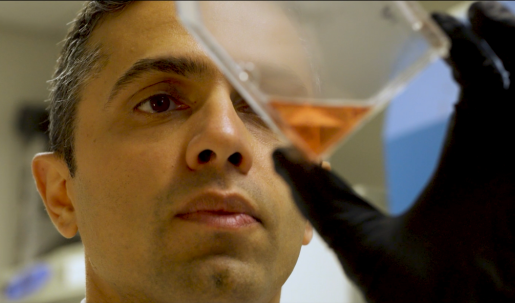All guts, all glory.
Dr. Saman Maleki, Immunologist & Cancer Biologist
Two years ago, we introduced you to Dr. Saman Maleki, a scientist who dared to think outside the box. Since then, his work has not only gained international recognition but also earned him the prestigious 2024 “Researcher of the Year” award at Western University.
Despite initial skepticism of his unconventional ideas, Dr. Maleki has proven bold thinking can change the future of cancer care.
Turning science into survival
Dr. Maleki is researching how fecal microbiota transplants (FMT) can be used to manipulate the gut microbiome and improve the effectiveness of cancer treatments.
In 2023, Dr. Maleki was named one of only seven Londoners to receive the Investigator Award from the Ontario Institute for Cancer Research (OICR) for his visionary approach to cancer treatment using this method.
How does FMT work?
1. The patient takes odourless, tasteless pills containing frozen human feces from healthy donors screened for pathogens. These capsules were pioneered and are prepared by researchers.
2. They wait seven days for the new microbiome to engraft and establish itself in the patient's body.
3. The patient starts immunotherapy—now with an increased chance of responding to treatment.
Milestones: Treating more patients with poop
Melanoma breakthrough:
- In partnership with other sites, Dr. Maleki conducted the world’s first clinical trial treating patients who have advanced melanoma with FMT.
- Every patient whose body successfully accepted the donor microbiome responded well to the treatment. On the other hand, those who couldn’t retain the donor microbiome showed no response at all. This demonstrated how successfully changing the microbiome was directly linked to a positive treatment response.
Kidney cancer trial:
- In an innovative trial, kidney cancer patients received multiple FMT doses combined with immunotherapy.
- The trial was submitted as a late-breaking abstract to the prestigious Society for Immunotherapy of Cancer, indicating his research is viewed as groundbreaking and highly relevant.
Lung cancer trial:
- In a recent trial, patients with lung cancer treated with FMT showed an incredible 75% response rate—compared to only 30% with standard treatment.
Future Plans
Triple-negative breast cancer
Dr. Maleki is expanding his FMT research to triple-negative breast cancer, an aggressive type of breast cancer that often lacks effective treatment options.
Pancreatic cancer
Pancreatic cancer—often called “where drugs go to die”—is also a focus of Dr. Maleki’s upcoming research. He hopes that by changing the microbiome within pancreatic tumours, he can make them more responsive to chemotherapy.
Canada’s largest microbiome network
By partnering with hospitals across Canada and the world, Dr. Maleki is building a network to further study the microbiome and its impact on cancer.
why donor support matters
Dr. Maleki’s research is only possible with donor support. Donations allow Dr. Maleki’s team to carry out life-saving trials, attract top scientists and purchase essential technology.
“Clinical trials and translational studies are very expensive, and that’s why we depend on philanthropy and donor support. You help us bring these treatments to patients and break down barriers so we can tackle the next type of cancer.”
- Dr. Saman Maleki

Damaging DNA
In addition to his microbiome research, Dr. Maleki’s lab is exploring how inducing DNA damage and blocking repair in cancer cells can make them more visible to the immune system. His team is developing a small molecule to target this repair pathway, opening new treatment options for patients who don’t respond to typical therapies.
If you would like to learn more or support immuno-oncology research at London Health Sciences Centre, please contact Pamela Taylor, Associate Vice President of Development, London Health Sciences Foundation at 519.685.8721 or email:
